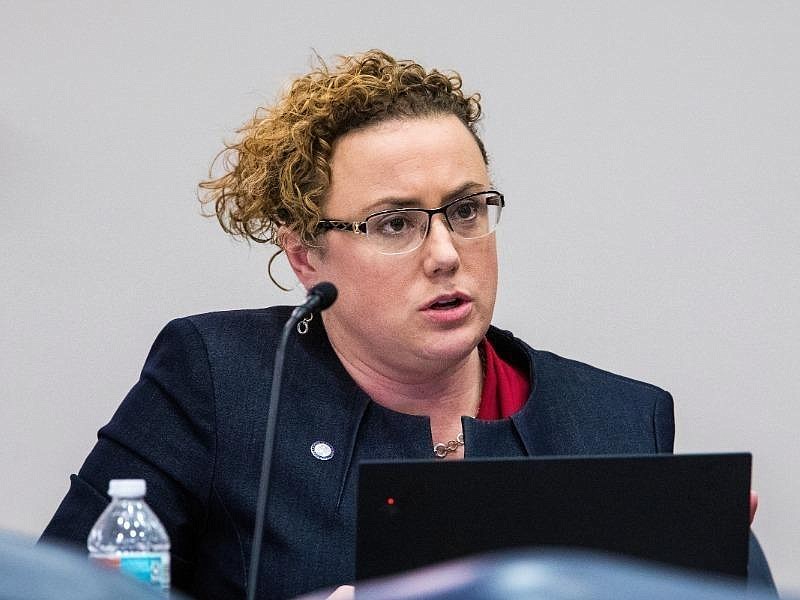- January 17, 2025
-
-
Loading

Loading

by: Christine Sexton
News Service of Florida
Physicians who terminate pregnancies solely because women don’t want children with disabilities could face felony charges under a bill moving through the Florida House.
Members of the House Health & Human Services Committee voted 12-8 on April 6 to advance the controversial bill (HB 1221), which would apply to physicians who know or should know abortions they perform were requested solely because of prenatal diagnoses, tests or screenings that indicated fetuses would have disabilities.
The Republican-controlled committee approved the bill on a nearly party-line vote, with Rep. Mike Caruso, R-Delray Beach, the only GOP member to vote against it.
Bill sponsor Erin Grall, R-Vero Beach, argued the bill was necessary to prevent eugenics, which involves using reproduction to try to lead to people with certain characteristics.
She said the Legislature has a duty “to have difficult conversations” and that she believes the proposal would help prevent “abortion from becoming a tool of modern-day eugenics.”
Members of the committee spent more than an hour asking questions and debating the bill, with the debate passionate and, at times, personal.
Committee member Allison Tant, D-Tallahassee, discussed her experience of raising a child with an intellectual disability. Tant said she was first advised something was wrong after a sonogram when she was 11 weeks pregnant.
“My doctor threw up his hands and he said, ‘I don’t know what to do. There’s something wrong. I don’t know what it is. Go see a specialist and you might need to consider termination,’” Tant recalled. “The termination I considered was the termination of my doctor. I couldn’t take that step. I worked too hard to get there.”
But her decision against having an abortion — made in consultation with her husband and physicians and, she said, prayer --- has come at an emotional and financial cost, she said.
Tant told committee members she had to fight to get her son early intervention services when he was as young as 3 and had to fight for him throughout his education. While it’s been hard, it’s not a decision she regrets, Tant said.
“Every single family must have the right to determine their own family issues,” she said. “They must make their own decision without mandate from people like us who are not directly involved in their lives.”
The bill includes in the list of disabilities such things as physical disabilities, intellectual or mental disabilities and Down syndrome. The bill includes an exception that would allow abortions “necessary to save the life of a mother whose ife is endangered by a physical disorder, illness or injury, provided that no other medical procedure would suffice for that purpose.”
Physicians who know or should have known that abortions were being performed because of prenatal diagnoses of disabilities would face third-degree felony charges and regulatory consequences.
If lawmakers ultimately pass the bill, Florida would be the 10th state to enact a law to prohibit so-called disability abortions. According to a staff analysis, such restrictions have been passed in Arkansas, Indiana, Kentucky, Louisiana, Mississippi, Missouri, North Dakota, Ohio and Tennessee.
Indiana’s law has been permanently enjoined, while legal fights continue about the laws in Arkansas, Indiana, Kentucky, Louisiana, Missouri, Ohio and Tennessee. Bans remain in Mississippi and North Dakota.
Committee member Kelly Skidmore, D-Boca Raton, said the bill would put another layer of shame on women who choose to have abortions and said it would force women to potentially lie to their physicians or shop for doctors who will perform abortions.
Tant also said the bill is moving forward while the House considers making a $40 million reduction to a Medicaid program that helps people with intellectual and developmental disabilities live in their homes and communities.
“So the message is clear, we really don’t value people with disabilities,” she said, adding more than 23,000 people are on a waiting list for what is known as the iBudget program.
After the approval Tuesday by the Health & Human Services Committee, the bill is positioned to go to the full House.
But the Senate version (SB 1664), filed by Sen. Ana Maria Rodriguez, R-Doral, remains stalled in the Senate Children Families and Elder Affairs Committee. That committee is chaired by Sen. Lauren Book, a Plantation Democrat who supports abortion rights.